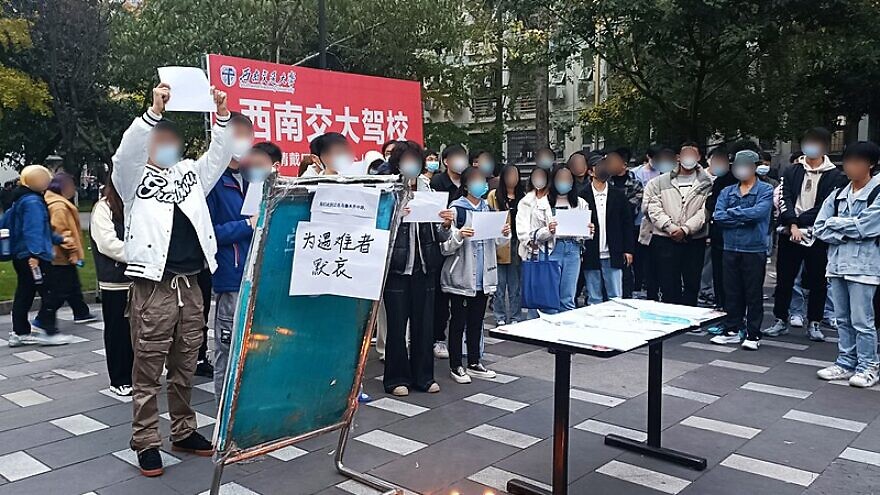There is no getting around the fact that we live in dangerous times, defined by the worst military conflict in Europe since the end of World War II and a global economic downturn.
Equally, there is no getting around the fact that the world’s authoritarian regimes are in deep trouble with many, perhaps the majority, of their subjects. In Russia earlier this year, thousands of opponents of Vladimir Putin’s brutal invasion of Ukraine were incarcerated by the authorities in a bid to crush any domestic dissent. In Iran, now Russia’s main military ally, anti-regime protests that have raged since the end of September—when Mahsa Amini, a young Kurdish woman, was murdered by the regime’s morality police for allegedly violating the hijab dress code—show few signs of dying down, despite the regime’s best efforts to repress them entirely.
In Iran, similarly, protests have been sparked by the regime’s contempt for the welfare of ordinary Iranians, frequently expressed through price hikes in the cost of fuel and food. But a pattern has emerged which indicates that anger over regime policies function as a gateway to a broader movement for the regime’s overthrow. The principal slogan of the Iranian protests is “Women, Life, Freedom”—the best riposte to a regime that trades on patriarchy, death and suppression. It is also a clarion call for regime change, and not mere political reform.
The Iranian pattern is visible in China as well. What began as a protest against “Zero Covid” developed into a more generalized rejection of the Communist regime itself. The slogans chanted by protestors in Shanghai were directed at both the Party and its leader, Xi Jinping. “Communist Party, step down,” and “Xi, step down,” they sang.
Even so, China is not Iran, in the sense that its regime rests on much stronger foundations, so it shouldn’t surprise us that the protests have petered out. But there is no denying that the sentiment underlying them remains in play and is potentially the source of a dramatic political transformation.
The problem, however, is the policy of western governments, who can see no way out of their dependency on Chinese exports. Indeed, the U.S. is China’s largest trade partner; in 2020, the year the pandemic spread like lightning, China’s trade surplus with the U.S.—the ratio of imported goods to exported goods—was more than $250 billion. Nor are the goods China exports restricted to two or three sectors. China sends the rest of the world cheap electronics, constituting more than a quarter of its GDP, as well as plastics, furniture, clothing, medical equipment and much, much more.
Over the last month, human rights activists have expressed concern about the intimate relationship between the American billionaire Elon Musk and the Chinese authorities. According to Yang Jianli, a U.S.-based Chinese dissident, Musk has drawn more than $1 billion in loans from Chinese state banks, meaning that the regime has a strong degree of leverage over the new owner of Twitter, the social media platform that is now wide open for Chinese manipulation and censorship. “It is one thing to buy a social media company in the U.S., where the government poses little threat to free speech,” he observed in a piece for the Daily Beast. “It’s another to buy Twitter when Musk’s other companies are entangled with China’s repressive regime, which has a history of forcing private companies to serve its interests.”
Back in October, about a month before his summit with Xi, U.S. President Joe Biden declared that we “can’t build a future that’s made in America if we ourselves are dependent on China for the materials that power the products of today and tomorrow.” The U.S. has already imposed export bans on certain Chinese semiconductors that can be deployed for military purposes. At his meeting with Xi, Biden raised this issue, as well as the issues of Taiwan and human rights on the Chinese mainland. After their discussions, the Chinese foreign ministry tweeted that the world “is big enough for the two countries to develop themselves and prosper together,” but that reads like a platitude. China’s abuses in Xinjiang, Hong Kong and Tibet, its lockdowns on its own citizens and its predatory approach to Taiwan all militate against what Communists once called “peaceful coexistence.”
Whilst we can now see the structural weaknesses underpinning the Iranian regime in all their glory, and therefore the distinct possibility of life outside the strictures of the Islamic Republic, in China it is fanciful to believe that the regime is going to collapse soon. Yet we should remain mindful of the Mishnah’s advice to “beware those in positions of power, for they only bring a person closer to them for their own needs.” Our wretched dependency on China does not compel us to trust that country’s rulers, just as is true with Russian and Iranian leaders.
There is a distinct prospect that following this latest burst of protests, China’s people will hunker down again instead of escalating the fight against the regime. The key is to remember, especially at the darkest times, that the spirit behind those protests—as Xi knows well—is always alive.


























